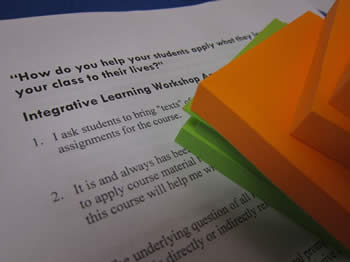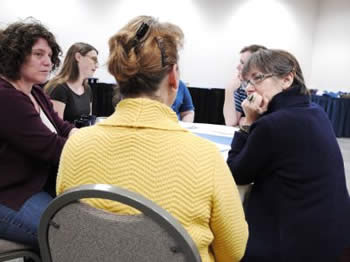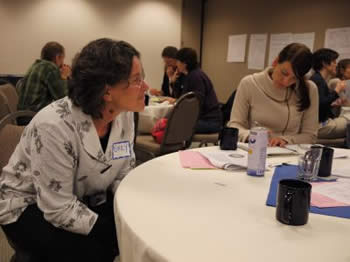Integrative Learning
Workshop Held Thursday, April 21, 2011 and Friday, April 22, 2011 from 9 a.m.-3 p.m.
Center for Meeting and Learning, Room 102, Lane Community College
(Click on a picture to see a gallery of photos from the workshop)
Resources
Dimensions of Disciplinary Understanding
Interdisciplinary Understanding: What Counts as Quality Work?
"Titan Ed Talk" on Integrative Learning
Create Your Own Integrated Learning Assignment for a Learning Community
Follow-Up Curriculum Development Application
Faculty Artifacts, Ideas, Posters, Integrative Assignments
Faculty Integrative Assignment Presentations
Workshop Facilitators:
Gillies Malnarich, Ph.D. and Emily Lardner, Ph.D., Co-directors of The Washington Center for Improving the Quality of Higher Education
View a relevant presentation by Gillies Malnarich
Workshop Themes:
Meeting Our Students Where They Are:
Course Design, Student Learning and Success
-
Teaching for understanding--the role of "real world" context in building students' learning confidence
-
Leveraging the key concepts of a discipline to foster development of college readiness and college success skills
-
Building student agency and autonomy
Using Research on the Three Learning Principles from How People Learn to Improve Student Learning
-
Engaging Resilient Preconceptions
-
Organizing Knowledge Around Core Concepts
-
Supporting Metacognition
-
Click here to view a pdf of How Students Learn
Essential Learning Across the Disciplines:
Developing Students' Metacognitive Abilities and Intellectual Identity
-
Helping students to understand the interrelatedness of the essential learning outcomes of their degree and helping them to apply this learning to new settings
-
Beginning with students' current understandings and helping students to move beyond them
-
Helping students understand academic discourse as distinct from their own communities' discourses
-
Helping students learn the "Big Ideas" of a discipline and how their daily work connects to itHelping students to apply knowledge and use it in new contexts
- helping students to transition from informal to formal ideas
- pedagogical implications of replacing superficial "coverage" with key concepts in a discipline
-
Assessment: evidence of student learning and success: "the framework for accountability should be students' demonstrated ability to apply their learning to complex problems" (C. Schneider, 2007).
Goals for this Workshop:
-
A hands-on professional development opportunity for faculty to apply research on student learning and college readiness to their course and assignment design.
-
An opportunity for discipline-based teams to address curricular trouble spots with assignments that help students overcome obstacles to learning, including uneven preparedness.
-
An opportunity to learn how to help students connect their learning across disciplines and in their lives. This connection is at the core of integrative learning.
-
A chance for faculty to develop pedagogical expertise at the instructional design phase on teaching and learning activities geared toward achieving student learning outcomes.



